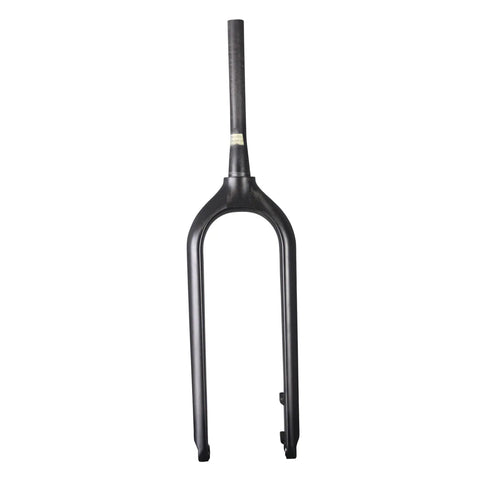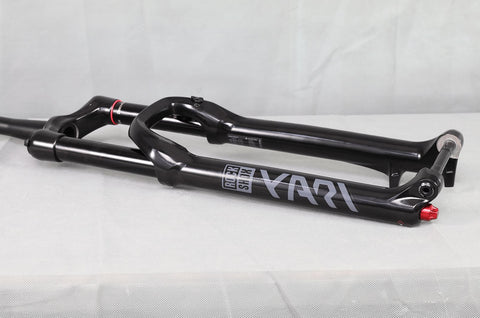What Is a Carbon Bike Fork?
You don't have to be an avid biker to know which part of the bike is called the fork. Yes, the two blades connect the front wheel to the main structure of the bike. Being one of the most essential parts of the bike that holds the entire weight of the front wheel, a fork is usually a metallic one made of iron, steel, or aluminum. But it can also be carbon composite, much lighter than steel forks and even aluminum ones. Carbon bike forks are a trendy bike upgrade that you can find on almost every high-end road and on racing bikes.
Generally, four types of carbon blades or forks work great for both light and stocky riders who want a smooth riding experience. Suppose you upgrade your classic steel forks to carbon for more reliable performance and long-term durability. In that case, you need to consider these four kinds of carbon forks- carbon disc road fork, carbon fat bike fork, carbon gravel fork, and carbon mountain bike fork.
Carbon Disc Road Fork
Road bikers who don't go off-road or on terrains prefer to ride on flat paved roads for speedy movements; the carbon disc road fork goes perfectly well with their bikes. This type of fork is engineered for bikes built for commuting, racing, utility cycling, and even to fulfill other recreational activities. Gone are those days when iron and steel forks used to have their foothold in the market with rigid blades of road and hybrid bikes. However, with the introduction of aluminum and carbon fiber, we see a drastic shift in this regard. High-end road and racing bike manufacturers have started adopting the crystalline structure of carbon materials to design their bikes. This sophisticated architecture of carbon materials allows forks to be more shock absorbent than ever, with better aerodynamic shapes and an ultimate lightweight experience. Therefore, even heavy riders can enjoy a great ride with drastically improved comfort than steel forks.
Carbon Fat Bike Fork
Fat bikes are typically designed for off-road biking over diverse terrains where normal road bikes won't stand a chance. As the size, weight, and thickness of fat bike wheels are completely different from road or hybrid bikes, there's no secret that the forks will be different, either. Often, a fork comes with a suspension device to provide riders with a comfortable cycling experience, even on bumpy surfaces. But the thick tires are already designed for ultimate traction for fat bikes, so the suspension is needed for only a few special purposes. Hence, the rigid carbon fat bike fork is enough to get away with diverse rides. Usually, the carbon-made fat bike forks are lightweight and come with large tire clearance so that multiple wheel sizes can be adjusted in the same fork. As carbon has a better lifespan than iron or steel, not only does the carbon fork handle uneven bumps, but the rigid frame also lives long enough.
Carbon Gravel Fork
A gravel bike is an upgraded version designed to handle off-road abuses. With a combination of road and cross-country bikes, gravel bikes are ideal for cyclocross events. Carbon fiber forks are ideal for gravel bikes where riders look for unprecedented performance and great traction on rocky terrains. Upgrade your bike fork to exceptionally lightweight, full-carbon gravel materials to ride over almost any surface with top speed. Like a fat bike or mountain bike forks, gravel forks are designed with extra clearance for different wheel sizes and better aerodynamic benefits.
Carbon Mountain Bike Fork
Mountain bikes, or MTB bikes, are a special category for extreme off-road rides such as terrains, hill climbing, and jungle escapades. In short, MTB bikes are designed for extreme adrenaline adventures, requiring a strong, rigid framework to rely on. Mountain bike forks come with both rigid and suspension, ideal for extreme off-roading. While you can find some cheap steel forks in mountain bikes, they can't beat the lightweight and shock-absorbing fork made of carbon fiber for great structural coherence. If a pro rider updates their bike to a carbon mountain bike fork, the difference can easily be noticed while zipping through trail obstacles with smoothness guaranteed.
FAQs on Carbon Bike Fork
1. Why is a carbon fork better than iron or steel forks?
There are several reasons to conclude that a carbon fork is always better than classic iron or steel forks regarding performance and effective aerodynamic designs. The biggest advantage of having a bike with a carbon fork is the unprecedented lightweight that makes gravity riding easier when climbing a terrain or sliding down a steep hill. For stocky or heavy riders, the carbon fork works great also, as the reduced road vibration can be evident instantly. Carbon forks, whether for MTB bikes or general road bikes, absorb shock more effectively than any other metallic materials, thus providing a better riding experience overall.
2. Is a carbon bike fork handmade?
Yes, almost all carbon bikes you can see everywhere are hand-assembled. The hands-on work that a carbon-made bike requires is intense. The fork and every part of a carbon bike must be assembled carefully, whereas automation has very little role.
3. Is carbon fork better than steel?
Since the inception of carbon fiber, it has proven to be stiffer and weighs lighter than the classic steel material used to manufacture bikes. Steel and iron forks are quite heavier when you compare them to carbon fiber, making the material a clear winner in the competition. A lighter bike will always provide faster performance on racing tracks or regular commuting. The natural rigidity also makes carbon fiber durable enough for long-term usage. Although everything comes at a price, a carbon fork is usually costlier than steel forks and has a high maintenance cost. Repairing a carbon fork is another thing that should be considered, as although the material is repairable, sometimes the cost could be higher than the replacement.
4. Why Should You Choose A Carbon Bike Fork?
A carbon bike fork is typically lighter and more forgiving than steel or iron. It's less stiff to bumps and corners. The heavier you are, and the faster you go, the bigger the benefits are. If you are looking for a supple ride, go for carbon bike forks, but remember that it might cost you more than steel forks.


